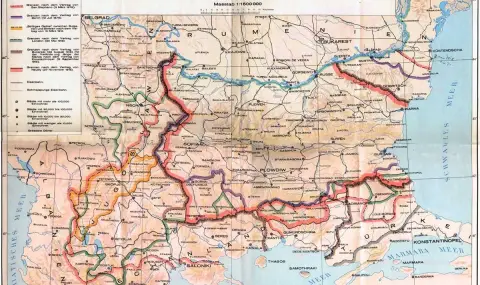On May 16, 1915, in the course of the First World War, the Entente hands Bulgaria its first note. The document proposes to the Bulgarian government to attack Turkey and seize Eastern Thrace as far as Media-Enos.
In return, after the end of the war,
The Entente promises that our country will receive the "undisputed zone" in Vardar Macedonia and assistance for Kavala and South Dobrudja.
According to the secret annex to the Bulgarian-Serbian treaty signed on February 29, 1912, the undisputed zone covers the territory east of the Kriva Palanka line – Gabovtsi village on Ohrid Lake.
During the Balkan War of 1912–1913, most of this area was conquered by the Serbian army. Despite the preliminary agreements, after the end of the war, Serbia refused to return the lands to Bulgaria. This worsened relations between the two countries and precipitated the outbreak of the Allied War of 1913.
At the beginning of the First World War, Bulgaria had not yet stabilized after the pogrom of the Inter-Allied War. Because of this, King Ferdinand I and the government of Dr. V. Radoslavov declared that the country took a position of neutrality towards the two warring groups - the Entente and the Triple Alliance. However, already in the first months of the war, the favorable position of the governing circles towards the countries of the Triple Alliance began to be seen.
In the spring and summer of 1915, when the need for new allies was extremely great for both military groups,
Bulgaria becomes the object of their desire to attract it to themselves.
Among Bulgarian society, there is no unified opinion on the country's position towards the military conflict. The majority of the Bulgarian people are against the country's participation in it. Farmers, radicals and broad socialists express this position.
The narrow socialists take an even more extreme position, raising the slogan of building a Balkan federation as the best means of solving the Bulgarian national question. Another part of the Bulgarian society is for Bulgaria's participation in the world war, but on the side of the Agreement - democrats, narodniaks and progressive liberals. And a third part, significantly smaller, is also for the intervention of Bulgaria in the war, but as an ally of Austria-Hungary and Germany - Radoslavists, part of the Stambolovists and Tonchevists.
Using the great powers given to him by the amended in 1911, Art. 17. of the Tarnovo Constitution,
Czar Ferdinand I makes secret diplomatic moves with the ruling circles of Vienna and Berlin.
He and his government rejected the proposals made by the Entente and further intensified their contacts with Austria-Hungary and Germany.
On August 24, 1915, a Bulgarian-German treaty and a secret agreement was concluded, supplemented by a military convention between Germany, Austria-Hungary and Bulgaria. According to these documents, Bulgaria undertakes to intervene in the world war, and in return the lands taken from the neighboring Balkan countries after the defeat in the Inter-Allied War are also provided.
In parallel with these agreements, another one was concluded on August 24, 1915 - with Turkey, regulating the correction of the border between the two countries along the lower course of the Maritsa River.
